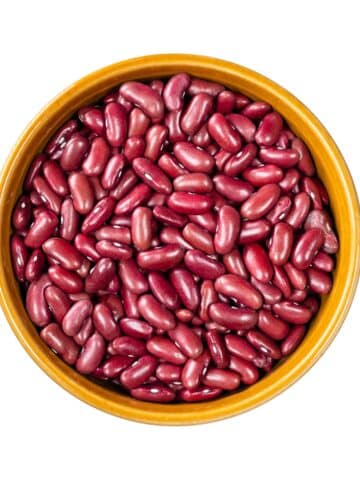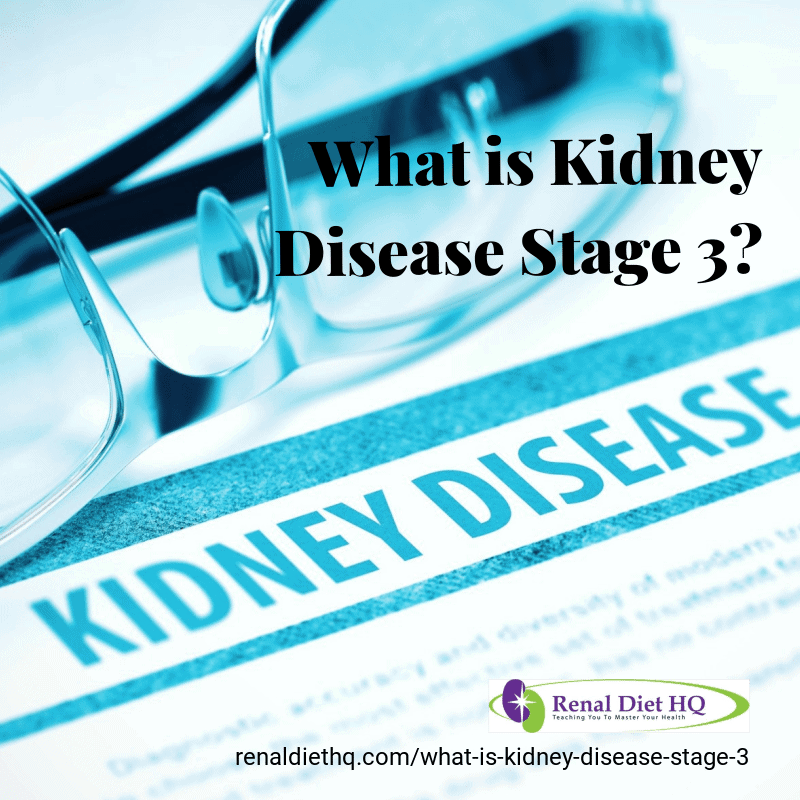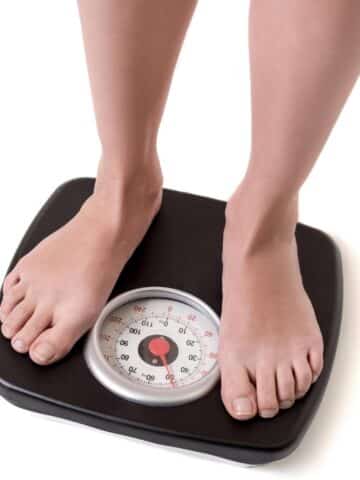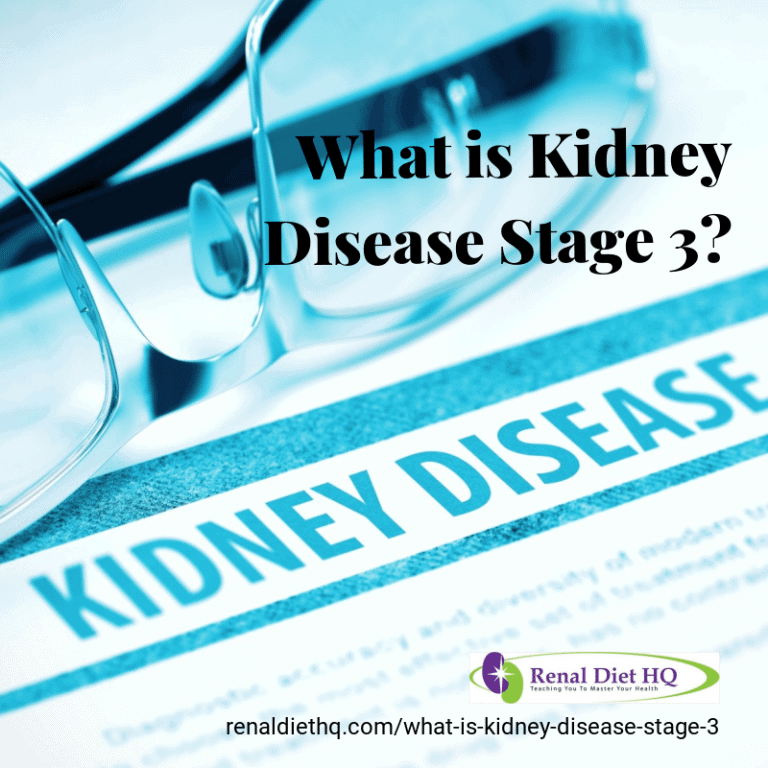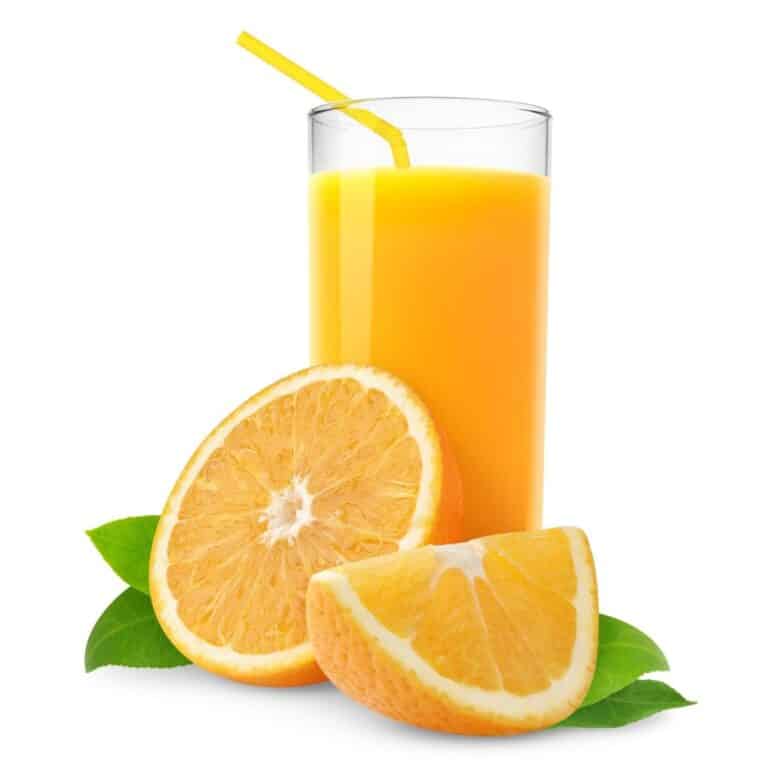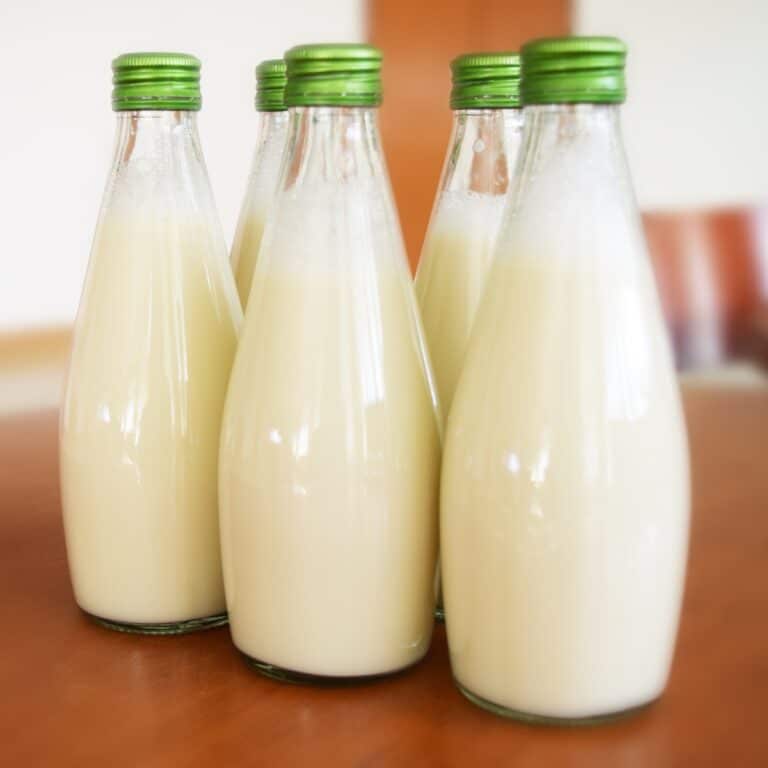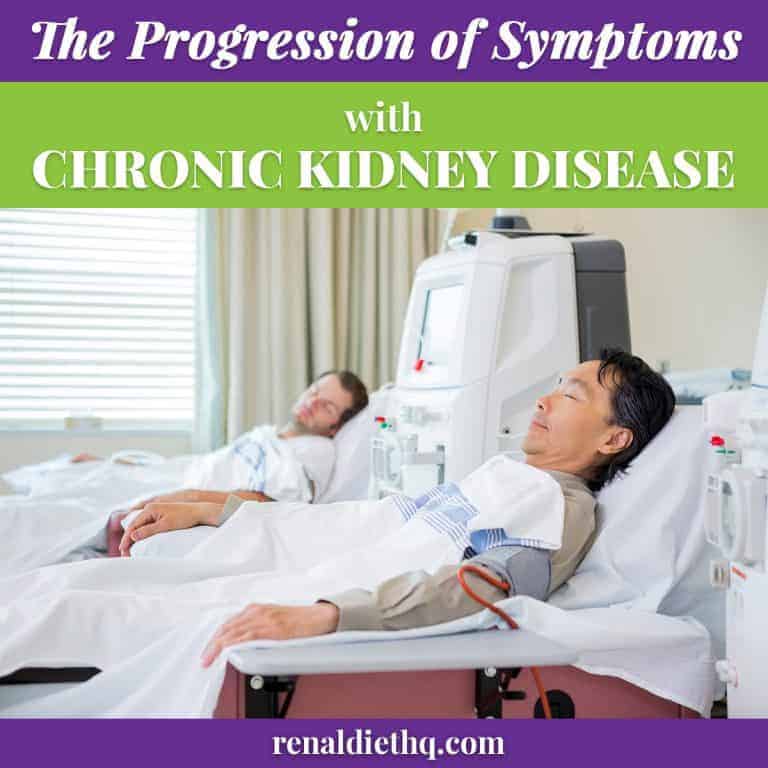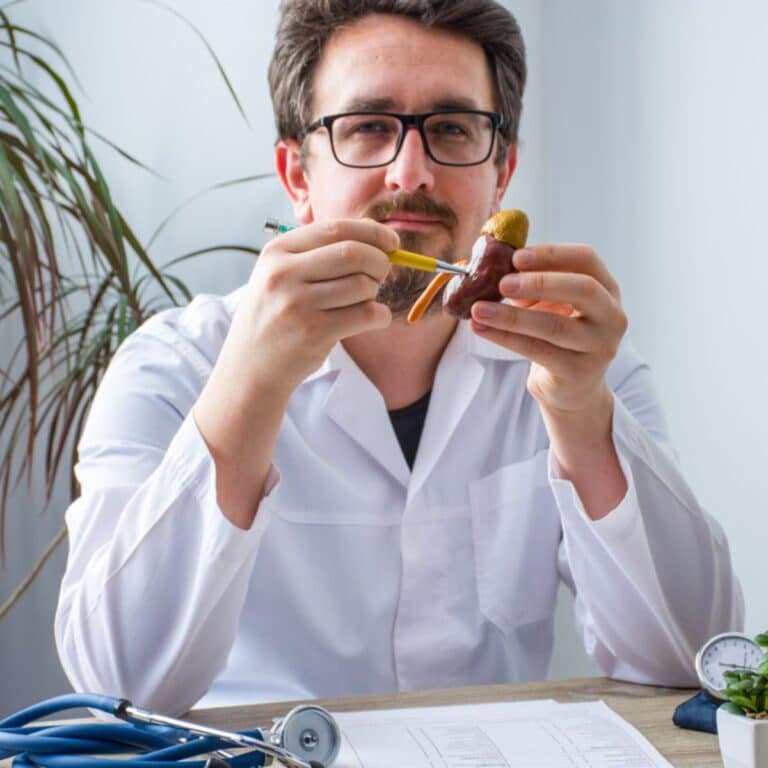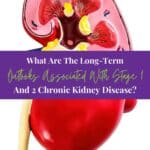Stage 2 Kidney Disease
Are you concerned about your kidney health? You may be at risk of stage 1 or 2 chronic kidney disease. This condition can cause significant damage to your kidneys, if left untreated, leading to a wide range of medical complications.
In this article, we'll explore what constitutes stages 1 and 2 of chronic kidney disease, the warning signs and symptoms, as well as treatments and lifestyle changes that can help slow its progression. We'll also provide dietary recommendations for people with both stages of the condition and discuss the importance of regular exercise in managing it.
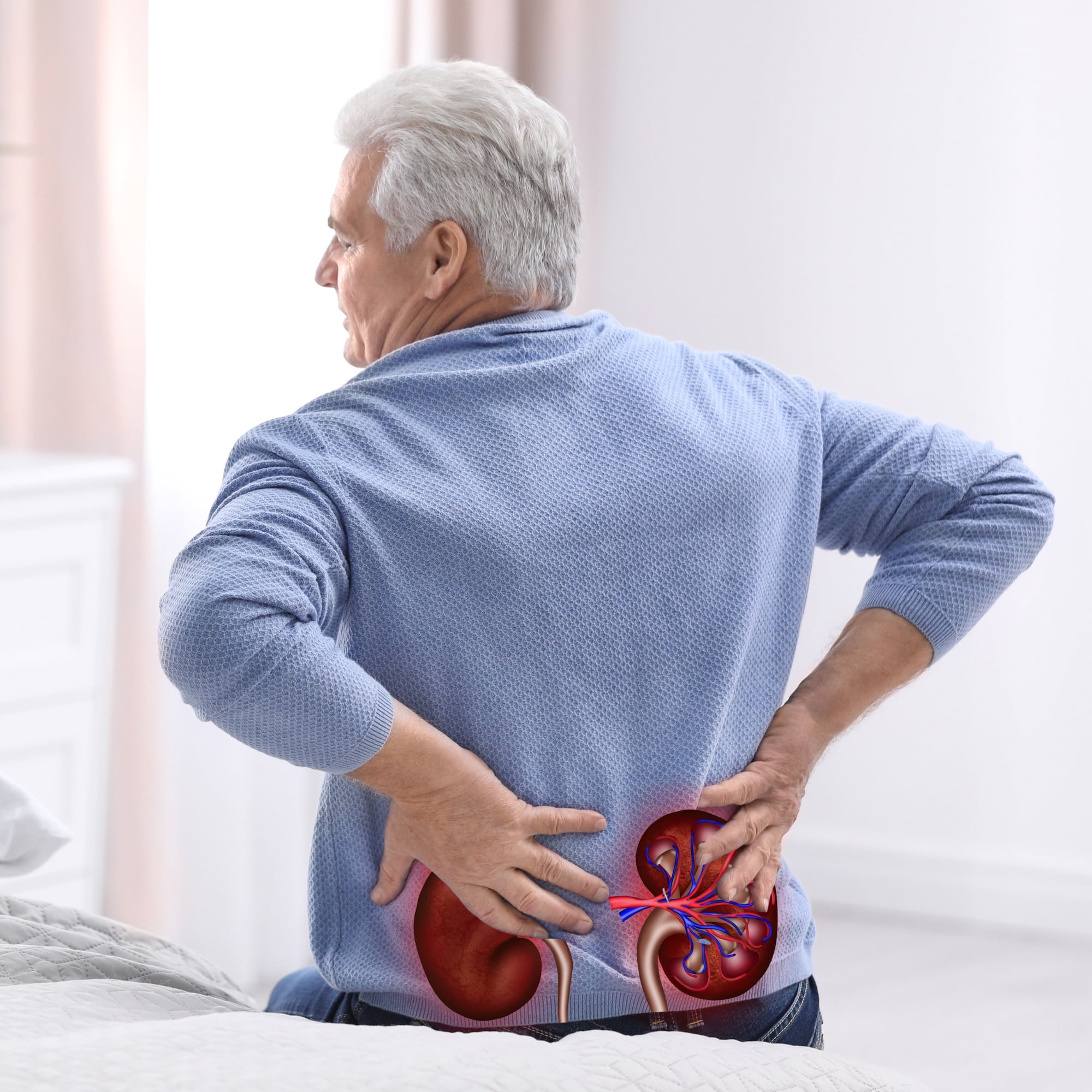
If you're worried about your current level of kidney health, read on to learn more!
Jump to:
- Key Takeaways
- Understanding Stage 1 Kidney Disease: Definition and Causes
- Identifying Symptoms and Early Warning Signs of Stage 1 Kidney Disease
- Medical Interventions and Treatments for Stage 1 Kidney Disease
- Lifestyle Adjustments for Slowing Stage 1 Kidney Disease Progression
- Dietary Recommendations for Patients with Stage 1 Kidney Disease
- Exercise and Physical Activity Role in Stage 1 Kidney Disease Management
- Defining Stage 2 Kidney Disease: Its Causes and Characteristics
- Recognizing Symptoms and Diagnosis of Stage 2 Kidney Disease
- Treatment Options and Medical Care for Stage 2 Kidney Disease
- Lifestyle Modifications to Hinder the Progression of Stage 2 Kidney Disease
- Dietary Guidelines for Managing Stage 2 Kidney Disease
- Importance of Regular Exercise in Stage 2 Kidney Disease Management
- FAQs for Stages 1-2 Kidney Disease
- Understanding the Role of Stage 2 Kidney Disease
Key Takeaways
- Early diagnosis and treatment are crucial to slow the progression of stage 1 and 2 chronic kidney disease.
- Lifestyle changes, such as maintaining a healthy diet, regular exercise, and stress reduction, play a significant role in managing stage 1 and 2 kidney disease.
- Medications, such as ACE inhibitors or ARBs, can help lower blood pressure and slow the progression of stage 1 and 2 CKD.
- Regular monitoring, check-ups, and adherence to medical recommendations are essential for managing stage 1 and 2 chronic kidney disease effectively.
For More Recipes and Ideas --->> Get Your Free Meals and Recipes That Are Perfect for Pre-Dialysis Diets, Pre-Dialysis with Diabetes, or Dialysis Diets.
Understanding Stage 1 Kidney Disease: Definition and Causes
Are you wondering what stage 1 kidney disease is and what causes it? Stage 1 kidney disease, also known as chronic renal insufficiency, is a progressive condition, in which the kidneys gradually lose their ability to function properly. It can lead to end-stage renal failure if not treated promptly and progresses to stage 5 CKD and possibly dialysis.
Risk factors for developing this condition include high blood pressure, diabetes, cardiovascular disease, and certain medications. Early diagnosis and treatment is important in order to slow the progression of the disease and improve prognosis outlook.
Kidney function tests are used to diagnose stage 1 kidney disease and measure how well the kidneys are functioning. These tests may include urine analysis, blood tests, imaging scans or biopsies.
Treatment for stage 1 kidney disease includes lifestyle changes such as controlling hypertension through diet and exercise, managing stress levels effectively, taking prescribed medications regularly, and reducing exposure to toxins or substances that may harm the kidneys.
It's important to note that while there is no cure for stage 1 kidney disease, early detection can help reduce symptoms by slowing down its progression. To ensure successful treatment outcomes, it's key to follow doctor's orders on diet modification as well as medication use strictly. At this point, you would not see a kidney specialist just yet.
Engaging in regular physical activity has been shown to be beneficial when living with this condition due to its positive effects on both mental health and overall physical well-being of individuals diagnosed with stage 1 kidney diseases.
Making healthy decisions every day can help protect your kidneys from further damage caused by chronic illness like stage 1 kidney diseases, so proper self-care should always be prioritized above all else. Taking time out of each day for relaxation activities such as yoga or meditation can also help reduce stress levels associated with this condition, while at the same time boosting overall immunity levels too!
Dealing with the loss of appetite, loss of kidney function, or signs of kidney damage can be tough, but these tips can help you! As always, feel free to speak to a kidney doctor about renal function or your specific level of kidney function.
Identifying Symptoms and Early Warning Signs of Stage 1 Kidney Disease
Struggling with symptoms of kidney failure? You may notice subtle changes in your body that can indicate early signs of renal problems--changes that you shouldn't ignore. Stage 1 Chronic Kidney Disease (CKD) is a condition which can cause damage to the kidneys and impair their ability to filter waste from the blood.
Early detection of this disease is important for preventing further damage or progression of symptoms. Below are common risk factors, symptoms, and preventative measures associated with CKD Stage 1:
| Risk Factors | Symptoms | Preventative Measures |
|---|---|---|
| High Blood Pressure High Cholesterol Diabetes Family History Age > 65 years old | Swelling in hands/feet Fatigue/Lack of Energy Nausea/Vomiting Frequent Urination Unintended Weight Loss | Regular Monitoring & Testing Healthy Diet & Exercise Regimen Alternative Therapies (Acupuncture etc.), Manage Stress Levels, Limit Caffeine Intake |
It's important to be aware of any changes in your body, even if they seem minor, as they could easily be signs of an underlying health issue. If you experience any potential symptoms related to CKD it's important to consult with your doctor as soon as possible. This is so they can assess your situation and provide proper guidance on how best to monitor and manage your condition going forward.
Taking preventative measures such as following a healthy DASH diet, exercising regularly, reducing stress levels, and limiting caffeine intake are also recommended for minimizing the risk of developing stage 1 CKD. With early detection and proactive management strategies, people living with stage 1 kidney disease can live healthy lives full of optimal wellness!
Medical Interventions and Treatments for Stage 1 Kidney Disease
If you've been diagnosed with early renal issues, it's important to know what medical interventions and treatments are available. The most common types of medications prescribed for stage 1 Chronic Kidney Disease (CKD) are angiotensin-converting enzyme inhibitors or angiotensin receptor blockers. These medications can help lower blood pressure and slow the progression of CKD.
Frequent renal monitoring is essential to ensure that medication dosages are effective and not causing any adverse side effects.
In addition to medication, lifestyle choices can make a significant difference in slowing the progression of CKD. Eating a healthy diet with plenty of fruits and vegetables, exercising regularly, avoiding smoking/tobacco use, maintaining a healthy weight, and reducing stress levels through relaxation techniques such as yoga or mindfulness meditation. All these activities can be beneficial for people living with Stage 1 CKD.
Finally, it's important to keep in mind that the prognosis outlook varies from person to person. Depending on how far advanced their disease is at diagnosis as well as other factors such as age and general health status.
Working closely with your doctor will help determine which treatment options are best suited for your individual situation, so you can receive support managing your condition effectively over time, especially if you're taking blood pressure medications.
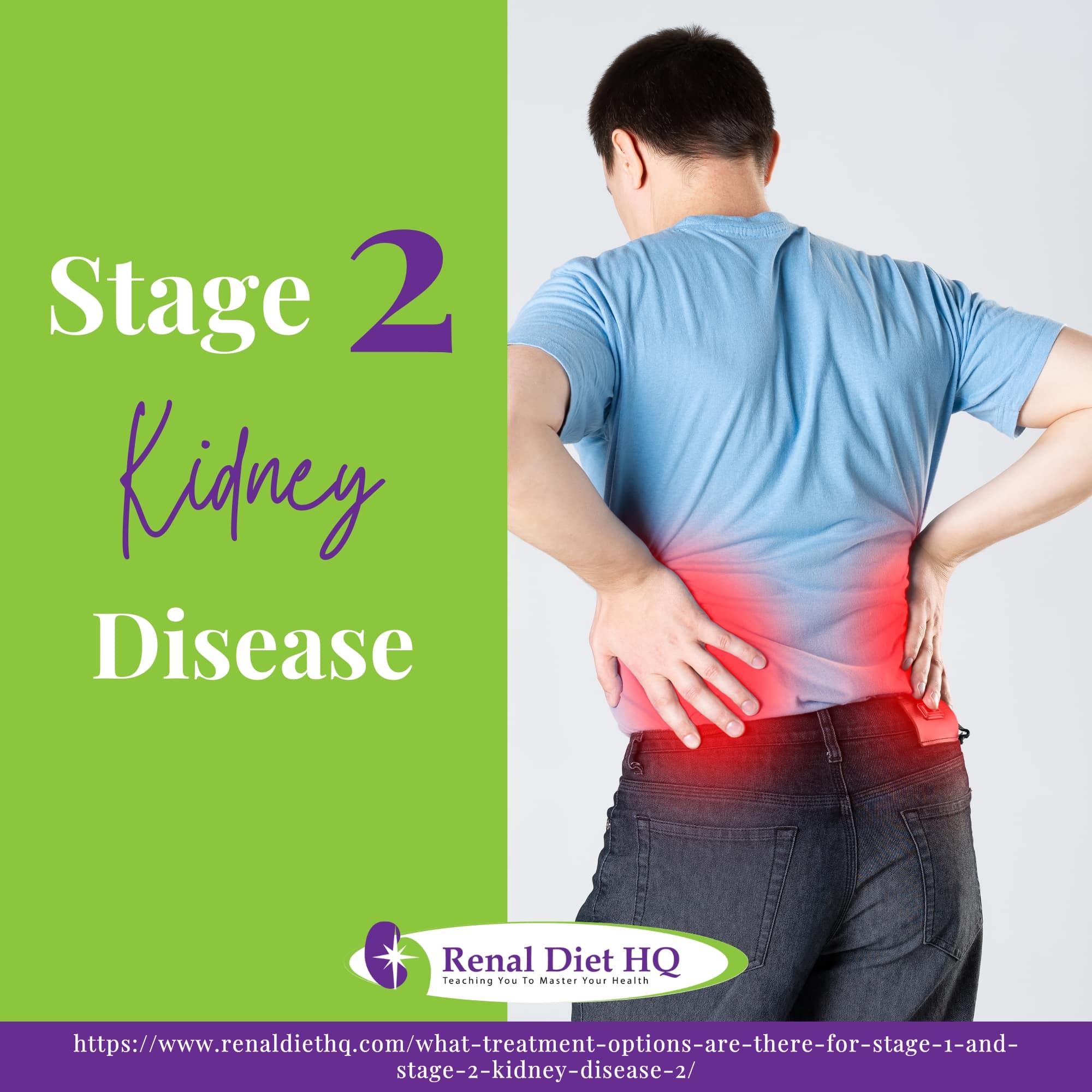
Lifestyle Adjustments for Slowing Stage 1 Kidney Disease Progression
Understanding life expectancy and making lifestyle changes and like eating healthier foods and exercising regularly, can help slow the progression of early renal issues. To effectively manage stage 1 chronic kidney disease, consider using alternative therapies such as meditation and yoga to reduce stress.
Monitor your progress by keeping a medical journal of symptoms related to your condition. Seek out support from family and friends or join a support group with people who are also dealing with similar conditions.
Setting realistic goals for yourself is also essential in managing this chronic illness. Focus on making small changes over time that will lead to better habits in the long run.
It's important to stay consistent and persistent in order to maintain good health while living with a chronic illness. The earlier you take control of your health, the more likely you are able to prevent further deterioration of the kidneys.
Make sure you get regular check-ups so that any potential problems can be caught quickly before they become too serious. It may take some time before you start seeing results from lifestyle adjustments but it's worth it in the end!
Dietary Recommendations for Patients with Stage 1 Kidney Disease
Maintaining a healthy diet and understanding dietary intake is essential for those living with stage 1 kidney disease, so it's important to understand the dietary recommendations for this condition.
Kidney-friendly diets should also include more fruits and vegetables than other food groups, as well as adequate amounts of protein. Patients should ensure they're getting enough daily fluids and may need additional supplements of vitamins or minerals, if advised by their doctor.
When following a kidney-specific nutrition plan, individuals with stage 1 kidney disease should focus on avoiding foods that can lead to further damage and monitoring their intake of processed foods, sugar-sweetened beverages, red meat, dairy products, and fried foods. It may be beneficial to avoid alcohol consumption, due to its potential detrimental effects on the kidneys.
Overall, creating an individualized plan tailored to each person's specific needs is key when managing any type of chronic kidney disease, while incorporating these dietary guidelines can help maintain optimal health for those living with stage 1 CKD. Monitoring progress closely with a physician or dietitian is essential in order to consistently make necessary adjustments along the way.
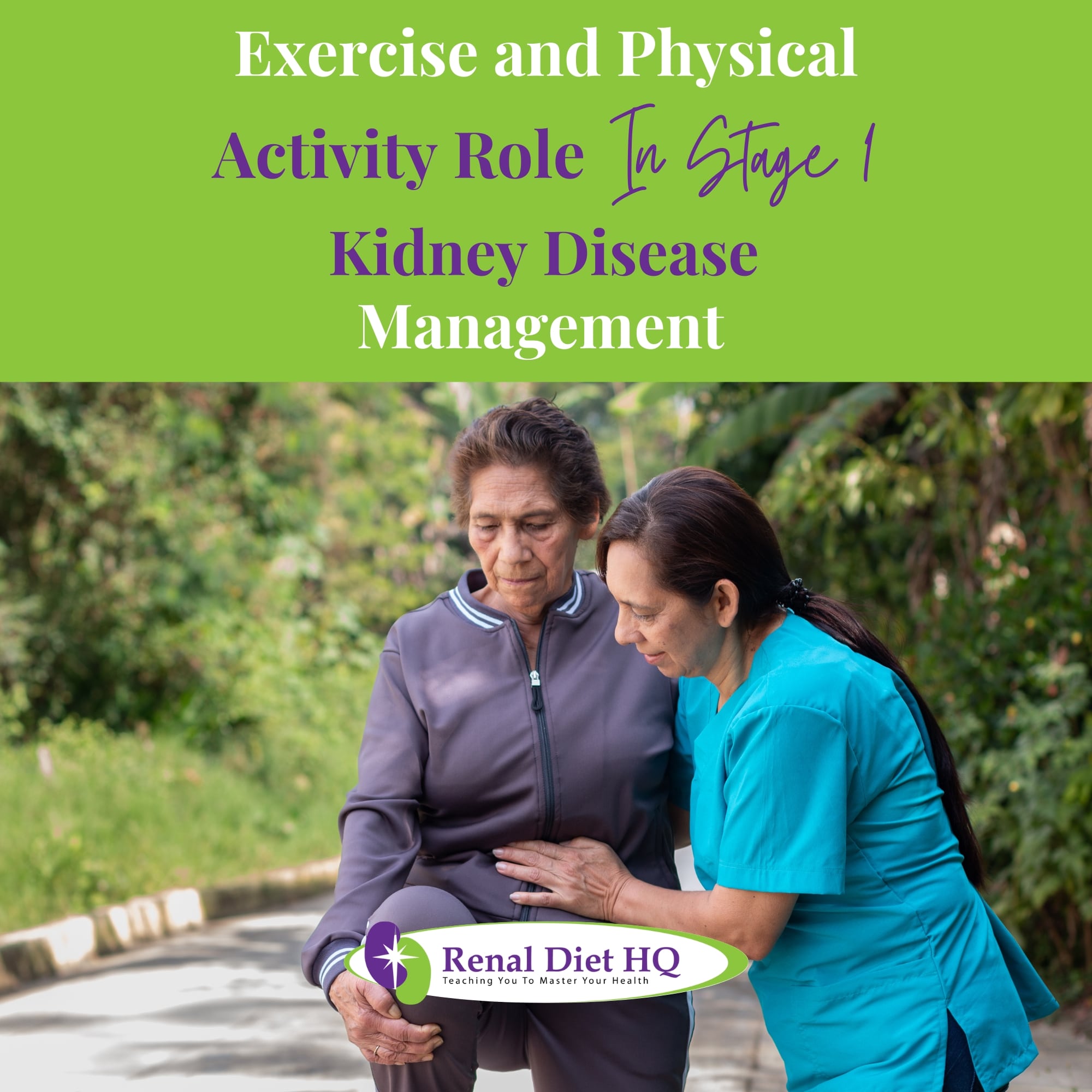
Exercise and Physical Activity Role in Stage 1 Kidney Disease Management
Staying active is essential for managing stage 1 kidney disease, so make sure to get your body moving! Exercise can help you maintain a healthy weight, reduce the risk factors associated with kidney disease, and improve your emotional and mental health. Regular physical activity can also provide great social support and stress relief.
Make sure to talk to your doctor before starting any exercise program since there may be some restrictions depending on how severe your condition is. Moderate intensity activities such as walking, jogging, bike riding, or swimming are all excellent options for people with stage 1 kidney disease.
It's important that you find something enjoyable that will motivate you to stay consistent in order to achieve the best results. If possible, try exercising outdoors, even just a few minutes a day can have tremendous benefits for both your physical and mental health.
It's also important not to overdo it; start slowly at a level that feels comfortable for you and gradually increase the intensity of your workouts over time. Never push yourself too hard or take on too much at once. Make sure to listen to what your body tells you, if anything doesn't feel right during exercise, then stop immediately!
Taking care of yourself physically will help manage the symptoms of stage 1 kidney disease and keep you feeling healthy long-term.
Patients with kidney disease should pay attention to the symptoms of kidney disease to see how exercise and physical activity play a role in stage 1 kidney disease.
Defining Stage 2 Kidney Disease: Its Causes and Characteristics
You're experiencing more than the usual aches and pains, and it's time to get a handle on what's going on with your body.
Stage 2 kidney disease is characterized by an increased risk of kidney damage or failure, so it's important to pay attention to any changes in your overall health. Causes of stage 2 kidney disease can be varied and include high blood pressure, diabetes, infections, genetic conditions, blockages, environmental toxins, and more.
Certain risk factors like age and family history may complicate diagnosis criteria and prognosis outlook for stage 2 kidney disease patients. The lifestyle impacts are potentially life-altering as this condition requires proactive management including dietary modifications, medication adherence, and regular medical checkups.
Understanding what's causing your symptoms will help you make informed decisions about how best to proceed with care for optimal outcomes. It's helpful to build a supportive healthcare team that has experience treating stage 2 kidney disease who can help guide you through treatment options tailored specifically for your needs.
You don't have to face this challenge alone. There are many ways you can manage the symptoms associated with stage 2 kidney disease while still living a fulfilling life.
Recognizing Symptoms and Diagnosis of Stage 2 Kidney Disease
Being aware of the signs and symptoms associated with stage 2 kidney disease is key to getting an accurate diagnosis. Patients may be monitored for risk factors such as high blood pressure or diabetes, or they may experience changes in appetite, weight loss, swelling of the extremities, and fatigue. Identifying these warning signs can help healthcare providers detect early stages of kidney disease and provide appropriate treatments.
Diagnostic tests are also necessary to accurately determine if there's a decrease in kidney function and severity level.
Patients should work closely with their healthcare team to develop coping strategies that'll help them manage their condition. These strategies might include diet modifications, exercise programs, stress management techniques, or medication adjustments. Caregiver support groups can also be instrumental in helping individuals monitor progress and cope better with this chronic condition by providing emotional support and assistance with treatment plans.
It's important for those affected by stage 2 kidney disease to seek medical advice as soon as possible after noticing any symptoms so that a proper diagnosis can be made quickly. With early detection and intervention through lifestyle modifications and medications, it's possible to slow down the progression of the illness before it becomes severe enough to require dialysis or a kidney transplant.
Those suffering from this chronic condition should stay informed about their prognosis while continuing to receive regular medical evaluation from their doctor or specialist for best results.
Treatment Options and Medical Care for Stage 2 Kidney Disease
Treating stage 2 kidney disease involves lifestyle changes, medications, and medical care to slow the progression of the illness. Prevention of any further complications is key in managing this condition. This can be done by making healthy dietary and lifestyle choices such as avoiding smoking, eating a balanced diet, maintaining a healthy weight, and exercising regularly.
Recognizing potential complications is also essential in providing proper supportive care for those with Stage 2 kidney disease. Some of these may include high blood pressure, anemia, bone disease, or fluid retention.
Depending on the severity of the illness and individual circumstances, dialysis or transplantation may become necessary options for treatment. Dialysis helps to filter out waste from the body when kidneys are no longer able to do so effectively themselves. Kidney transplantation replaces damaged kidneys with a healthy one from a donor, which can offer significant improvements in the quality of life if successful.
Overall, it is important that those diagnosed with Stage 2 kidney disease seek out treatment immediately and follow their doctor's advice closely to ensure they receive adequate medical care and help prevent further complications from occurring. With patience and dedication to following through with prescribed treatments, many patients have found success in managing their condition successfully for years to come.
Lifestyle Modifications to Hinder the Progression of Stage 2 Kidney Disease
Slowing the progression of Stage 2 kidney disease requires lifestyle modifications. Here are key components in hindering the deterioration of your kidneys:
- Managing stress: Taking time for yourself to relax and unwind is essential. Yoga, mindfulness exercises, and meditation can help reduce anxiety and improve overall well-being.
- Reducing salt: A low-salt diet can reduce strain on your kidneys by preventing fluid retention. Avoiding processed foods can also lower sodium intake while providing a healthier alternative to meet dietary needs.
- Avoiding toxins: Cigarettes, alcohol, and recreational drugs cause further damage to already weakened kidneys. It's important to avoid these substances as much as possible or quit altogether if you're a smoker or drinker.
- Controlling blood pressure and protein intake: Monitoring your protein intake is essential. Aim for 0.6g - 0.75g per kilogram body weight per day for optimal health benefits from consuming protein-rich foods. Controlling high blood pressure is also important because hypertension accelerates deterioration of kidney function. Talk to your doctor about ways to lower it effectively through medication or lifestyle changes.
By making small adjustments where necessary, you'll be able to continue living life without fear of worsening symptoms associated with Stage 2 kidney disease. Seek medical advice regularly, so that any potential problems are identified quickly before they become serious issues down the line!
Dietary Guidelines for Managing Stage 2 Kidney Disease
Now that you have a better understanding of the lifestyle modifications to help manage stage 2 kidney disease, it's important to know how to eat properly. A low sodium diet is critical for managing stage 2 chronic kidney disease because it helps reduce fluid retention and lower blood pressure.
It's also important to monitor potassium levels, since high levels can be dangerous for those with CKD. Be sure to limit your intake of processed foods as they contain high amounts of sodium and potassium.
In addition, controlling fluid intake plays an important role in helping manage this condition. Drinking too much can cause an increase in blood pressure and put additional strain on the kidneys. Pay attention to thirst signals and drink enough fluids daily, while avoiding sugary drinks like soda or sweetened coffee beverages.
A proper balance of protein is another key dietary factor when managing stage 2 chronic kidney disease. Protein-rich diets help maintain muscle mass but too much protein can lead to a build-up of waste products which can place further stress on the kidneys. Talk with your doctor about what level of protein intake is right for you based on your current health status and any medications you take.
Salt substitutes are often recommended by doctors for those with CKD because they contain less sodium than regular table salt, making them suitable for a low-sodium diet. However, there are many brands available, so make sure you read labels carefully before purchasing one as some may contain high amounts of potassium or other minerals that could potentially worsen symptoms associated with kidney failure if consumed in excessive amounts.
By following these nutritional guidelines, individuals who suffer from stage 2 chronic kidney disease will be able to effectively manage their condition, while still enjoying delicious meals that provide vital nutrients needed for optimal health and wellbeing!
Importance of Regular Exercise in Stage 2 Kidney Disease Management
Exercising regularly is essential in helping maintain a healthy lifestyle for those with stage 2 CKD. Research has shown that exercise can help to reduce the symptoms associated with the disease and improve quality of life. Exercise can also help to slow down the progression of kidney disease, as well as reduce blood pressure, cholesterol levels, and body weight.
It is important for those with stage 2 CKD to understand the benefits of regular exercise, as well as any diet challenges or lifestyle changes that may be necessary. Knowing what types of exercises are safe and beneficial for someone with CKD is also important. Low-impact activities such as walking, swimming, or cycling are generally recommended.
Strength training should be done gradually and under medical supervision if possible. It's also important to be aware of certain myths about exercising while having CKD, such as avoiding all physical activity,- which are not true.
It's essential for patients with stage 2 kidney disease to talk to a healthcare professional before beginning an exercise program. This is so they can determine their individual needs and create an appropriate plan tailored just for them. With proper guidance from their healthcare team, those suffering from this condition could benefit greatly from regular exercise by improving their overall health and wellbeing.
FAQs for Stages 1-2 Kidney Disease
The long-term outlook for individuals with chronic kidney disease can be improved by making healthy lifestyle changes. Exercise, diet modifications, and self-management are important components of a successful treatment plan.
Chinese medicine and herbal remedies may also provide some relief from symptoms associated with chronic kidney disease. It's important to discuss your concerns with your doctor or healthcare provider to develop an individualized plan that's tailored to your needs.
With the right support, you can take control of your condition and improve your quality of life.
You may be interested in exploring home remedies or alternative treatments for your health concerns. Dietary changes, an exercise routine, acupuncture therapy, Chinese herbal medicine, and stress management are all potential options that may help you feel better.
Incorporating a balanced diet with plenty of fruits and vegetables can help improve overall well being. Developing an appropriate exercise plan tailored to your needs may assist you in managing your symptoms.
Acupuncture therapy has been used to help reduce stress and inflammation. Chinese herbal medicine is another option that uses plant-based compounds to support the body's natural healing process. Lastly, focusing on reducing stress levels through yoga or mindfulness techniques can also be beneficial for improving mental health and well-being.
You can help prevent kidney disease by making some lifestyle modifications.
Weight management is essential, as excess weight can lead to increased stress on the kidneys.
Eating a healthy, balanced diet and cutting back on processed foods is also important for kidney health.
Regular exercise can help improve circulation and reduce stress levels.
Practicing stress management techniques such as deep breathing or yoga can be beneficial in maintaining healthy kidneys.
Making these changes to your lifestyle will not only help you avoid kidney disease, but it will also benefit your overall well-being.
Understanding the Role of Stage 2 Kidney Disease
You can take preventive measures and proper steps to control and manage your stage 1 or stage 2 chronic kidney disease. Talk to your doctor about lifestyle changes such as dietary modifications, exercise routines, and medical treatments that are right for you. If you are struggling with understanding initial treatment and treatment goals.
Staying on top of your diet and exercising regularly is key in helping slow the progression of both stages of chronic kidney disease, as well as following any recommendations from your healthcare provider.
Taking charge of your health now can help ensure a better quality of life in the future. Kidney disease patients looking at the history of kidney disease or finding a cure for kidney disease should pay attention to these tips as much as possible.

